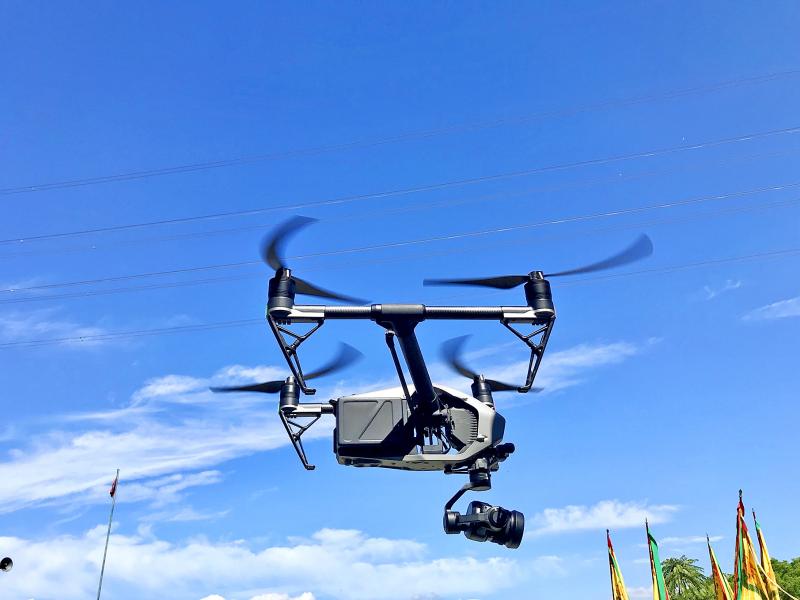China-made commercial drones might contain back doors and malware that transmit flight and video data to the government in China, an official said yesterday.
Speaking on condition of anonymity, the senior official said that Chinese drones, widely used by farmers for crop dusting, pose a significant cybersecurity threat to users and the government.
Beijing has unrestricted access to private user data held by Chinese corporations, which are obligated to cooperate with the country’s national intelligence efforts under China’s National Intelligence Law, the official said.

Photo courtesy of a reader
In Taipei, government agencies have taken steps to remove Chinese-manufactured devices and software from official use as President Tsai Ing-wen (蔡英文) has made cybersecurity a priority in her national security policy, the source said.
Security protocols were tightened to no longer allow middle and high-ranking officials to use Chinese-made electronics for work or personal use, they said.
The official spoke on the matter following a statement by the National Communications Commission (NCC) on Thursday that said Xiaomi Corp’s (小米) Mi 10T 5G smartphones have built-in censorship capabilities and can transmit user data to servers in Beijing.
The commission said that its Telecommunications Technology Center in October last year tested a model sold in Taiwan, after the Lithuanian National Cyber Security Center on Sep. 21 last year discovered the device’s censorship capabilities.
The official yesterday said that while Xiaomi disavowed security issues with its products by saying that the features did not appear in models sold in Taiwan and Europe, the claims were not supported by the NCC’s independent analysis, and its report raised troubling implications about Chinese electronics.
The ban on devices applies to government employees only and not private citizens, the source said, adding that the government could only advise the public against buying products with compromised security features.

ALIGNED THINKING: Taiwan and Japan have a mutual interest in trade, culture and engineering, and can work together for stability, Cho Jung-tai said Taiwan and Japan are two like-minded countries willing to work together to form a “safety barrier” in the Indo-Pacific region, Premier Cho Jung-tai (卓榮泰) yesterday said at the opening ceremony of the 35th Taiwan-Japan Modern Engineering and Technology Symposium in Taipei. Taiwan and Japan are close geographically and closer emotionally, he added. Citing the overflowing of a barrier lake in the Mataian River (馬太鞍溪) in September, Cho said the submersible water level sensors given by Japan during the disaster helped Taiwan monitor the lake’s water levels more accurately. Japan also provided a lot of vaccines early in the outbreak of the COVID-19 pandemic,

Kaohsiung Mayor Chen Chi-mai (陳其邁) on Monday announced light shows and themed traffic lights to welcome fans of South Korean pop group Twice to the port city. The group is to play Kaohsiung on Saturday as part of its “This Is For” world tour. It would be the group’s first performance in Taiwan since its debut 10 years ago. The all-female group consists of five South Koreans, three Japanese and Tainan’s Chou Tzu-yu (周子瑜), the first Taiwan-born and raised member of a South Korean girl group. To promote the group’s arrival, the city has been holding a series of events, including a pop-up

TEMPORAL/SPIRITUAL: Beijing’s claim that the next Buddhist leader must come from China is a heavy-handed political maneuver that will fall flat-faced, experts said China’s requirement that the Dalai Lama’s reincarnation to be born in China and approved by Beijing has drawn criticism, with experts at a forum in Taipei yesterday saying that if Beijing were to put forth its own Dalai Lama, the person would not be recognized by the Tibetan Buddhist community. The experts made a remarks at the two-day forum hosted by the Tibet Religious Foundation of His Holiness the Dalai Lama titled: “The Snow Land Forum: Finding Common Ground on Tibet.” China says it has the right to determine the Dalai Lama’s reincarnation, as it claims sovereignty over Tibet since ancient times,

Temperatures in some parts of Taiwan are expected to fall sharply to lows of 15°C later this week as seasonal northeasterly winds strengthen, the Central Weather Administration (CWA) said today. It is to be the strongest cold wave to affect northern Taiwan this autumn, while Chiayi County in the southwest and some parts of central Taiwan are likely to also see lower temperatures due to radiational cooling, which occurs under conditions of clear skies, light winds and dry weather, the CWA said. Across Taiwan, temperatures are to fall gradually this week, dropping to 15°C to 16°C in the early hours of Wednesday